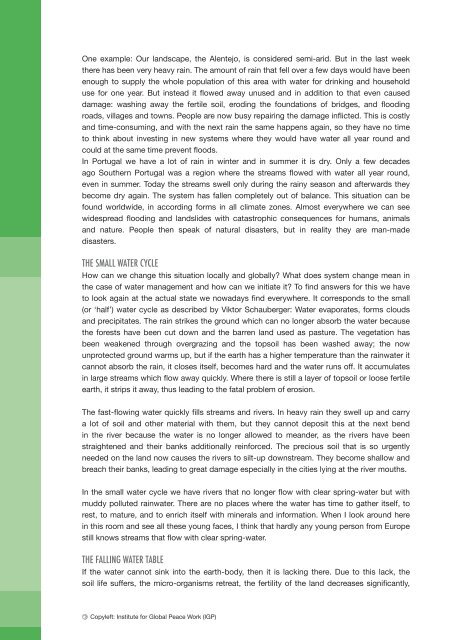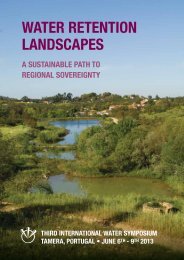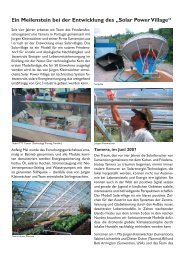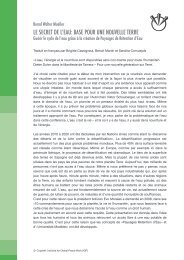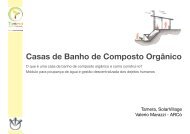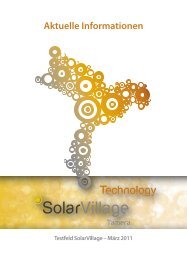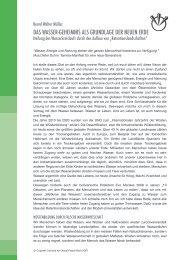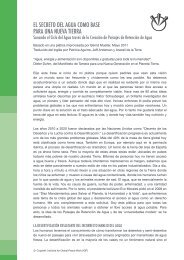You also want an ePaper? Increase the reach of your titles
YUMPU automatically turns print PDFs into web optimized ePapers that Google loves.
One example: Our landscape, the Alentejo, is considered semi-arid. But in the last week<br />
there has been very heavy rain. The amount of rain that fell over a few days would have been<br />
enough to supply the whole population of this area with water for drinking and household<br />
use for one year. But instead it flowed away unused and in addition to that even caused<br />
damage: washing away the fertile soil, eroding the foundations of bridges, and flooding<br />
roads, villages and towns. People are now busy repairing the damage inflicted. This is costly<br />
and time-consuming, and with the next rain the same happens again, so they have no time<br />
to think about investing in new systems where they would have water all year round and<br />
could at the same time prevent floods.<br />
In Portugal we have a lot of rain in winter and in summer it is dry. Only a few decades<br />
ago Southern Portugal was a region where the streams flowed with water all year round,<br />
even in summer. Today the streams swell only during the rainy season and afterwards they<br />
become dry again. The system has fallen completely out of balance. This situation can be<br />
found worldwide, in according forms in all climate zones. Almost everywhere we can see<br />
widespread flooding and landslides with catastrophic consequences for humans, animals<br />
and nature. People then speak of natural disasters, but in reality they are man-made<br />
disasters.<br />
THE SMALL WATER CYCLE<br />
How can we change this situation locally and globally? What does system change mean in<br />
the case of water management and how can we initiate it? To find answers for this we have<br />
to look again at the actual state we nowadays find everywhere. It corresponds to the small<br />
(or ‘half’) water cycle as described by Viktor Schauberger: Water evaporates, forms clouds<br />
and precipitates. The rain strikes the ground which can no longer absorb the water because<br />
the forests have been cut down and the barren land used as pasture. The vegetation has<br />
been weakened through overgrazing and the topsoil has been washed away; the now<br />
unprotected ground warms up, but if the earth has a higher temperature than the rainwater it<br />
cannot absorb the rain, it closes itself, becomes hard and the water runs off. It accumulates<br />
in large streams which flow away quickly. Where there is still a layer of topsoil or loose fertile<br />
earth, it strips it away, thus leading to the fatal problem of erosion.<br />
The fast-flowing water quickly fills streams and rivers. In heavy rain they swell up and carry<br />
a lot of soil and other material with them, but they cannot deposit this at the next bend<br />
in the river because the water is no longer allowed to meander, as the rivers have been<br />
straightened and their banks additionally reinforced. The precious soil that is so urgently<br />
needed on the land now causes the rivers to silt-up downstream. They become shallow and<br />
breach their banks, leading to great damage especially in the cities lying at the river mouths.<br />
In the small water cycle we have rivers that no longer flow with clear spring-water but with<br />
muddy polluted rainwater. There are no places where the water has time to gather itself, to<br />
rest, to mature, and to enrich itself with minerals and information. When I look around here<br />
in this room and see all these young faces, I think that hardly any young person from Europe<br />
still knows streams that flow with clear spring-water.<br />
THE FALLING WATER TABLE<br />
If the water cannot sink into the earth-body, then it is lacking there. Due to this lack, the<br />
soil life suffers, the micro-organisms retreat, the fertility of the land decreases significantly,<br />
©<br />
Copyleft: Institute for Global Peace Work (IGP)


